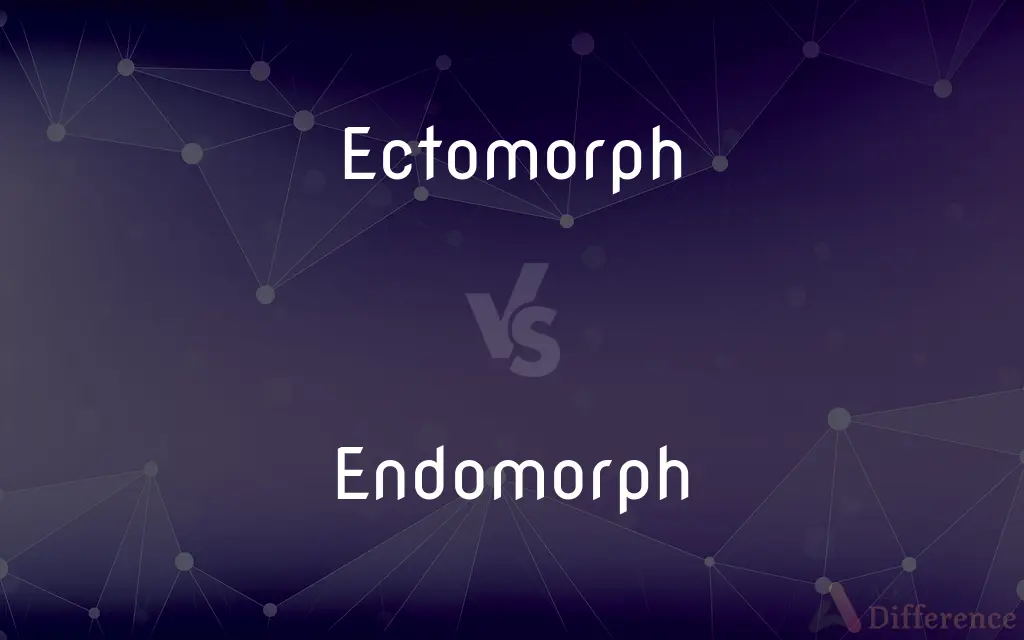Ectomorph vs. Endomorph — What's the Difference?
Edited by Tayyaba Rehman — By Fiza Rafique — Updated on April 5, 2024
Ectomorphs are characterized by a lean and tall body type, whereas endomorphs have a rounder and more solid build.

Difference Between Ectomorph and Endomorph
Table of Contents
ADVERTISEMENT
Key Differences
Ectomorphs are typically characterized by their slim and linear physique, with a fast metabolism that makes it hard for them to gain weight, whether it's muscle or fat. On the other hand, endomorphs tend to have a higher body fat percentage, a rounder physique, and a slower metabolism, making them more prone to weight gain.
While ectomorphs often find it challenging to build muscle mass due to their high metabolic rate, endomorphs may struggle with losing weight but can gain muscle more easily. This difference profoundly affects their approach to nutrition and exercise.
Ectomorphs usually excel in endurance sports due to their light frame and efficient metabolism, whereas endomorphs often have an advantage in strength and power-based activities due to their larger frame and muscle mass.
Ectomorphs may need to consume higher amounts of carbohydrates and calories to gain weight and muscle, focusing on dense and frequent meals. Endomorphs, in contrast, might focus on a lower carbohydrate intake and higher protein and fiber consumption to support weight loss and muscle maintenance.
Understanding one's body type can be crucial for tailoring fitness and nutrition plans. Ectomorphs might prioritize resistance training to build mass and reduce cardio, while endomorphs could incorporate more cardio and high-intensity interval training to aid in fat loss.
ADVERTISEMENT
Comparison Chart
Body Type
Lean, with less natural muscle and fat.
Rounder, with more natural muscle and fat.
Metabolism
Fast, making it hard to gain weight.
Slower, making it easier to gain weight but harder to lose.
Exercise Strength
Endurance sports, like long-distance running.
Strength and power activities, like weightlifting.
Nutrition Focus
High calorie and carbs to gain weight and muscle.
Lower carbs, higher protein for weight loss and muscle gain.
Muscle Building
Challenging due to fast metabolism and lean physique.
Easier due to natural strength but complicated by fat gain.
Compare with Definitions
Ectomorph
A body type characterized by a lean, tall, and slim physique, often with difficulty gaining weight.
Despite eating a lot, his ectomorph body type makes it hard for him to gain muscle.
Endomorph
A body type characterized by a rounder figure, higher body fat, and a stout build, often with difficulty losing weight.
People with an endomorph body type may struggle more with weight loss due to their slower metabolism.
Ectomorph
Ectomorphs have a high metabolism that burns calories quickly.
She can eat whatever she wants without gaining weight because she's an ectomorph.
Endomorph
They may find it easier to gain muscle but also gain fat more readily.
As an endomorph, he can gain muscle easily but has to be mindful of his fat intake.
Ectomorph
They typically excel in endurance-based activities due to their body composition.
As an ectomorph, long-distance running comes naturally to him.
Endomorph
Endomorphs have a slower metabolism, leading to easier weight gain.
She has an endomorph body type, so she needs to watch her diet closely.
Ectomorph
Ectomorphs may need to consume more calories to see muscle growth.
To bulk up, an ectomorph might need to eat more than someone of another body type.
Endomorph
Endomorphs might focus on high-intensity and cardio workouts for effective weight management.
High-intensity interval training works well for endomorphs trying to lose weight.
Ectomorph
Their slender frame is often accompanied by small joints and lean muscle mass.
His ectomorph frame makes it hard to put on any fat or muscle.
Endomorph
Their physique is often better suited for power and strength sports.
Her endomorph build gives her an advantage in strength competitions.
Ectomorph
An individual having a lean, slightly muscular body build in which tissues derived from the embryonic ectoderm predominate.
Endomorph
A mineral enclosed within another mineral, such as rutile or tourmaline in quartz.
Ectomorph
Someone with a lean, only slightly muscular body
Endomorph
An individual characterized by relative prominence of the abdomen and other soft body parts developed from the embryonic endodermal layer.
Ectomorph
(bodybuilding): Theoretical body type in which a person has a high metabolism. Such a person can easily maintain a low fat physique, but does not add muscle or body weight easily.
Endomorph
A mineral, especially a crystal, enclosed within another
Ectomorph
A person with a thin non-muscular body
Endomorph
A person of the endomorphic physical type, characterised by big bones, round face, large trunk and thighs and a naturally high degree of body fat, especially around the midsection.
Endomorph
(bodybuilding) A person having a theoretical body type with slow metabolism in which weight is gained easily, but fat levels are hard to reduce. Endomorphic bodybuilders tend to be the most massive.
Endomorph
A crystal of one species inclosed within one of another, as one of rutile inclosed in quartz.
Endomorph
A heavy person with a soft and rounded body
Common Curiosities
What is an ectomorph body type?
An ectomorph is characterized by a lean, slim physique with a fast metabolism, making it difficult to gain weight or muscle.
What characterizes an endomorph?
Endomorphs have a rounder, more solid build with a tendency to gain weight easily due to a slower metabolism.
Can ectomorphs become strong?
Yes, ectomorphs can become strong by focusing on resistance training and consuming enough calories to support muscle growth.
What sports are best for ectomorphs?
Ectomorphs often excel in endurance sports like long-distance running or cycling.
Can someone be a mix of ectomorph and endomorph?
Yes, many people are a mix of body types, displaying characteristics of both ectomorphs and endomorphs.
How do metabolism differences affect ectomorphs and endomorphs?
Ectomorphs have a fast metabolism that burns calories quickly, while endomorphs have a slower metabolism.
Can body types change over time?
Lifestyle, diet, and exercise can influence one's physique, but genetic predispositions largely dictate body type.
Are endomorphs able to lose weight easily?
Endomorphs may find it challenging to lose weight due to their slower metabolism but can achieve results with a proper diet and exercise plan.
Do ectomorphs need a special diet?
Ectomorphs often require a higher calorie intake with ample carbohydrates and proteins to support weight and muscle gain.
How should endomorphs adjust their workouts?
Endomorphs may benefit from incorporating more cardio and high-intensity interval training to help with fat loss.
Which exercises are most effective for endomorphs?
Strength training combined with high-intensity cardio can be effective for endomorphs.
Why might endomorphs struggle with weight loss?
Their slower metabolism and propensity to store fat make weight loss challenging for endomorphs.
Are there specific nutritional strategies for ectomorphs?
Ectomorphs may focus on calorie-dense foods and frequent meals to increase their calorie intake.
What challenges do ectomorphs face in muscle building?
Their fast metabolism and lean build make it hard for ectomorphs to gain weight and muscle.
What dietary adjustments should endomorphs consider?
Endomorphs might limit carbohydrate intake, focusing on proteins, fibers, and healthy fats to support weight loss.
Share Your Discovery

Previous Comparison
Scepter vs. Sceptre
Next Comparison
Reach vs. HitAuthor Spotlight
Written by
Fiza RafiqueFiza Rafique is a skilled content writer at AskDifference.com, where she meticulously refines and enhances written pieces. Drawing from her vast editorial expertise, Fiza ensures clarity, accuracy, and precision in every article. Passionate about language, she continually seeks to elevate the quality of content for readers worldwide.
Edited by
Tayyaba RehmanTayyaba Rehman is a distinguished writer, currently serving as a primary contributor to askdifference.com. As a researcher in semantics and etymology, Tayyaba's passion for the complexity of languages and their distinctions has found a perfect home on the platform. Tayyaba delves into the intricacies of language, distinguishing between commonly confused words and phrases, thereby providing clarity for readers worldwide.
















































